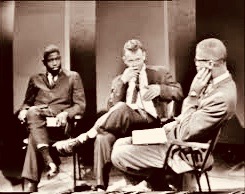Malcolm X and His Vision of Racial Justice for African Americans by Charles Lewis Nier III

Malcolm X – Interview At Berkeley University (1963)
Guilty as Charged: Malcolm X and His Vision of Racial Justice for African Americans Through Utilization of the United Nations International Human Rights Provisions and Institutions
“We declare our right on this earth to be a man, to be a human being, to be respected as a human being, to be given the rights of human beings in this society, on this earth, in this day, which we intend to bring into existence by any means necessary.”
Malcolm X1
Introduction
In 1959 the image of Malcolm X burst onto white America in a Mike Wallace television documentary entitled: The Hate That Hate Produced.’ The image of Malcolm X which emerged was the personification of black rage. Such a characterization, however, illustrates and perpetuates the misunderstandings that have surrounded Malcolm X in life and death. In order to gain an understanding of him, it is necessary to realize that he was a constantly evolving individual, particularly in terms of his political
ideology. As Malcolm X described it: “[m]y life has always been one of changes.”3 Such evolution has inevitably led to a series of drastically differing interpretations of his legacy. Perhaps the most significant stage of Malcolm X’s ideological evolution occurred…. to read more go to the link below:
https://elibrary.law.psu.edu/cgi/viewcontent.cgi?article=1424&context=psilr

